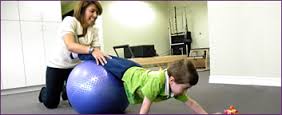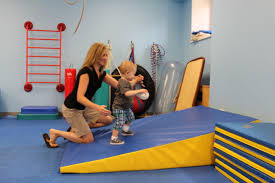So your child needs Physical Therapy—what now? How can you make the most of your therapy
sessions? What should you expect from
therapy? How can you apply the things you’ve
learned? This will give you a general idea of what Physical Therapy might look like for you and your child.
Most, but not all, Pediatric Physical Therapists are women,
so I will refer to the therapist in this article as “she”. (Please forgive me, all you wonderful male
therapists out there!) Your therapist
will probably become your best friend and ally in regards to your child and
their problems. She will listen to your
issues, trials, and complaints. She will
understand, like many others don’t, because she is going through this with you
and has experienced similar problems with other children and families! She will
provide advice and suggestions—from the type of shoes to wear, ways to position
your baby in his crib, toys to
stimulate growth and development, ways to play that will exercise the muscles
that are weak, etc.
 |
| Physical Therapy for Children |
Your Physical Therapist will ask you lots of questions at
your first session, so try to go prepared. Don’t be offended. This is information that can be helpful to
understanding your child and their problem. She might ask questions like: What was your pregnancy and delivery
like? How long did your baby stay in the
hospital? Does your child have any
specific diagnoses? What specialist does
your little one see? When did she roll
over? When did he sit alone for the
first time? When did she take her first
steps? What are his favorite toys? What
makes your child happy? What makes your
child sad, frustrated, angry? What do YOU feel are your child’s strengths? What are your biggest concerns? Discuss your
concerns, questions, and expectations.
 |
| Physical Therapists Love Using Large Therapy Balls |
Your therapist will perform an Initial Assessment to
determine your child’s strengths and limitations. She might use standardized
testing (tests that are administered and scored in a consistent manner, which
makes it possible to compare the relative performance of individual against the
“standard” performance of another individual of the same chronological age).
Depending on the primary problem with which your child presents, she may do a
muscle test, a balance test, or measure the range of motion (ROM) in your
child’s joints.
 |
| Practice Walking on Uneven Surfaces |
The therapist will inform you of the results of the testing
and let you know whether therapy is indicated for your child. She will specify the frequency (times per
week or month), duration (how long each session will run), and possibly the
length of time that therapy might continue (weeks or months). Some therapy is Clinic-based, meaning that
you will need to take your children to the clinic or hospital for their therapy
sessions. Other Programs, especially for young children, provide Home-based
therapy, where the therapist visits the home of the child or the child’s
daycare provider and the sessions occur in those familiar surroundings. She
will set goals for your child based on the results of the testing and will have
activities and exercises planned that will help your child accomplish those
goals.
 |
| Fun Activities to Improve Srength |
Therapy with babies and children is usually in the form of
play. It is very specific play that will
help your child move in new ways, gain strength, develop new skills, and
advance toward their goals.
 |
| Physical Therapy Should be Fun! |
Who visits, babysits, interacts, or plays with your
child? You might want to invite them
(after getting permission from your attending therapist) to accompany you to a
session or, if you are having Physical Therapy in your home, invite them to a
Physical Therapy session at your house.
They can see firsthand what your child is working on and what activities
they can do with your child to help improve the carry-over of those skills.
 |
| Your PT Will Help Your Child Learn New Skills |
 |
| Improving Balance |
Remember, you are a vital part of the team
and of the entire therapy process. You
have the responsibility for your child 24/7.
Make the most of your parenting time!
Your therapist is a valuable resource, so get as much information from
her as you can so that you can apply what you’ve learned and help your child
advance between sessions.
by Trisha Roberts, Early Intervention Physical Therapist
www.proeducationaltoys.com
www.proeducationaltoys.com
Copyright © 2016 TNT Inspired Enterprise, LLC,
All rights reserved.
Unauthorized duplication is a violation of
applicable laws.


Hey,
ReplyDeleteThanks for sharing such an amazing and informative post. Really enjoyed reading it . :)
Regards
Apu
physical therapist job description